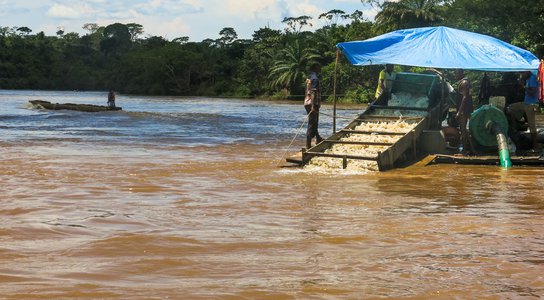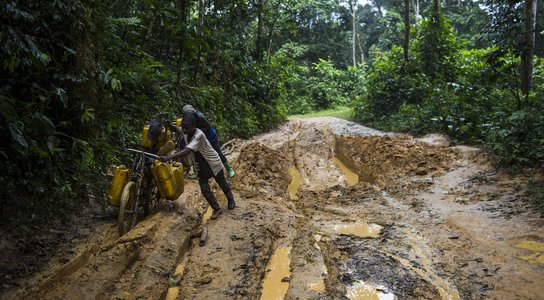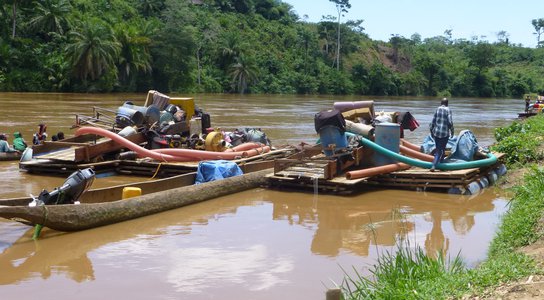Last July Global Witness published ‘River of Gold ’, a report that revealed how a private Chinese company distributed AK47s and cash to local armed groups to secure access to rich gold deposits during a boom in eastern Democratic Republic of Congo. One year on, disappointingly little has been done to address the chronic corruption and lack of transparency in the gold mining sector that our report exposed, despite the clear evidence laid out.
We established that some of the gold was traded internationally to two companies in Dubai, while the Congolese officials charged with oversight of the mining sector either turned a blind eye to, or were themselves involved in, corruption linked to the boom.
Within Congo
The reaction in Congo was immediate. The story crisscrossed the country’s radio networks.
A two-day strike ensued in the town at the epicentre of the boom, Shabunda, as the population demanded suspension of the Chinese company, a call echoed in a letter from local chiefs. Then a statement from civil society called for the state to clean up the gold trade. In Kinshasa, diplomats raised questions.
Congo's national Minister of Mines took action. He announced a “genuine clean up”. A government anti-fraud team was dispatched to investigate. Then followed detentions: in October two Congolese officials, an ex provincial minister and one French national, a representative of the Chinese company Kun Hou Mining, were held in Kinshasa for questioning. Local miners in Shabunda reported that illegal taxation decreased as scrutiny intensified. The population waited for justice to be done.
But the people have been disappointed. One year on from the publication of our report, despite the discussions and investigations, little has changed in real terms in eastern Congo’s artisanal gold sector.
The report of the investigative team was never made public. Held for a few short weeks in Kinshasa, the four detainees were released without explanation and two of them - both Congolese mining officials - returned to their posts. Kun Hou Mining quietly moved its operations to another territory in the same province. The companies in Dubai did not respond to our report.
Investigations like River of Gold reveal the true cost of many of the resources that our industries and economies are built upon. Revelations like these should spur systemic change at both a local level and internationally along gold supply chains. A failure to do so undermines local and international efforts to establish responsible trade along gold supply chains in eastern Congo and beyond.
At a local level, the absence of reform points to a fundamental breakdown in the social contract between the Congolese state and its people. Revenues from natural resources are not responsibly managed or used to provide desperately needed goods and services to the population – a phenomenon that extends beyond South Kivu right to the top of the state.
Over the last year the Governor of South Kivu, Marcelin Cishambo, consistently blocked efforts to hold individuals to account for the wrongs outlined in River of Gold. He disregarded instructions from the national Minister of Mines to suspend Kun Hou Mining on at least two occasions. The magazine Jeune Afrique revealed how in December 2015 he requested an advance payment of $90,000 from Kun Hou for its 2016 operations – so not only ignoring instruction to suspend the company, but actively seeking money from it . In 2017 when Kinshasa opened a new investigation into mismanagement by one of the mining officials detained for the Shabunda scandal, Cishambo pleaded to keep the official, Mr John Tshonga, in South Kivu.
Local civil society repeatedly called for Tshonga to be questioned and for him to step down. His staff apparently walked out in March of this year in protest over his work. In the same month the provincial Mining Division officially cut ties with Tshonga’s agency “until order is re-established”. The mining agency headed by Tshonga failed to deposit any revenue into provincial coffers between 2014 and 2015 for gold dredging, despite collecting official taxes throughout.
A petition calling for the Governor to step down was signed by almost 40,000 signatories in South Kivu according to local media. In June eighteen provincial MPs summoned him to parliament and introduced a motion of no confidence. The Governor never honoured the date with his MPs – in July he resigned.
On 12th July and in the Governor’s absence, South Kivu’s Vice Governor filed for a loan of almost 1.3 million USD (200 million FrC) from Congolese Rawbank, a private bank, allegedly to repay the province’s debts and pay its civil servants. The provinces’ bank accounts were allegedly frozen when Cishambo stepped down.
Meanwhile, civil society activists receive increasing threats for exposing the truth about what is going on in the province’s mineral sector. Their monitoring and independent oversight is a critical part of building a responsible and transparent mineral trade – and yet local and international activists are increasingly the targets of threats and intimidation. After “River of Gold” Global Witness investigators joined the ranks of our civil society colleagues who face intimidation for the work they do to hold companies and authorities to account.
Internationally
Response to our report was also limited along international supply chains. Dubai’s regulator and promoter of gold and diamond trading, the Dubai Multi Commodities Centre (DMCC) did not respond to Global Witness’ requests for comment on the Shabunda story. Almost a year later in May 2017 a DMCC representative told the BBC World Service’s Business Daily that the license of one of the companies linked to the Shabunda boom - Alfa Gold Corp DMCC - had been revoked in July 2016 for failings in unspecified “compliance requirements”.
Global Witness is not aware of any other action by Dubai authorities to hold to account other individuals and companies linked to this case. The Chinese Embassy in Kinshasa received a copy of the report but did not respond. Marcelin Cishambo and Kun Hou Mining did not respond to repeated requests for comment ahead of the report’s publication. John Tshonga said that his agents had followed the law and had not collaborated with armed groups.
Today’s gold supply chains span a vast constellation of countries, companies and economies. An international web of traders, banks and jewellers appear to buy South Kivu’s gold and overlook, or choose not to see, what or who their commerce is really funding.
Until stories like River of Gold are acted upon this abusive, inequitable gold trade will continue.


